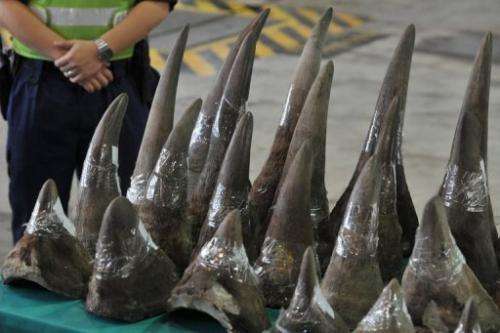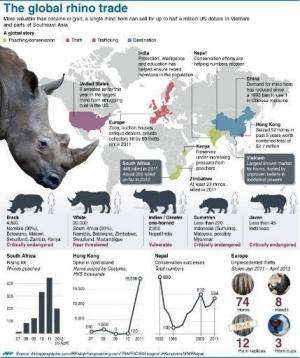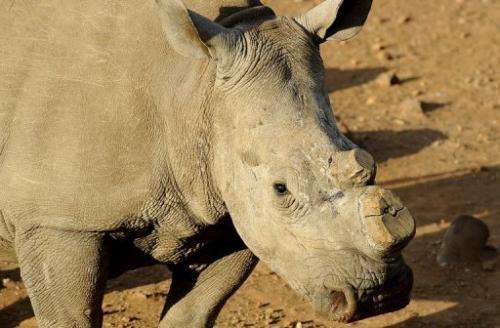Smuggled rhinoceros horns are displayed in Hong Kong's Customs and Excise Department Offices in 2011 after being found in a shipping container from South Africa. Global wildlife monitoring network TRAFFIC has said that with a total of 281 animals killed as of July, there was a "predicted loss of 515 by year end if current poaching rates continue".
Global wildlife monitoring network TRAFFIC warned Tuesday that 515 rhinos could perish by the end of the year if no action is taken to stem the illicit trade in rhino horns.
In its latest report, the agency said that with a total of 281 animals killed as of July, there was a "predicted loss of 515 by year end if current poaching rates continue".
South Africa, home to about three quarters of Africa's 20,000 or so white rhinos and 4,800 critically endangered black rhinos, has in recent years witnessed an unprecedented spike in sophisticated, violent and organised rhino-related criminal activities.
Last year 448 rhinos were killed compared to 13 animals in 2007.
South Africa has lately scaled up its fight against illegal poaching and trade in rhinos horns, arresting 176 suspects so far this year, more than the 165 arrested in the 12 months of 2010.
Graphic factfile on the global underground trade in poached rhino parts.
"It seems this year that efforts are begining to pay off. We have seen a great increase in arrests. We are also beginning to see some significant sentencing," said Jo Shaw, co-author of the report.
But she warned that even with the successful stories of high-value arrests the criminal syndicates appeared generally to be a step ahead—better equipped, well funded.
"As anti-poaching security levels are stepped up, the poaching gangs become more aggressive and increasingly sophisticated," she said.
The report named Vietnam as the worst offender fuelling the trade in the black market for rhino horns.
"The bottom line is that we are not close to ending this crisis yet, we are probably going to get record numbers this year," warned the report's co-author Tom Milliken, who is also an expert on rhinos at TRAFFIC.
The grounded horn, which is believed by some to cure cancers, has taken on a new use and is now being pushed as a recreational drug mixed with drinks at elite "rhino wine associations" parties in the belief that it cures hangover.
The report says the only way to end illegal rhino hunting is to cut off the demand, by pushing Vietnam to boldly show commitment and decisively enforce laws that prohibit trade in the horns.
It was revealed at the launch of the report that South Africa and Vietnam are set to sign a landmark deal to help stem rhino poaching and the illicit trade in rhino horns.
"I think the heat is clearly on Vietnam. I think we are going to see some changes. The good news today is that the MOU with South Africa is about to be signed," said Milliken.
The network did not give details of the memorandum of understanding, but it is believed to centre on law enforcement.
Vietnam's deputy foreign affairs minister Le Loung Minh was last week in South Africa where he held talks over illegal wildlife hunting, trade and trafficking with his counterpart Ebrahim Ebrahim.
A black dehorned rhinoceros is shown August 3, 2012 at the Bona Bona Game Reserve in South Africa. South Africa has seen a devastating increase in poaching in recent years as black-market demand for rhino horn has grown. Last year poachers killed 448 rhinos, up from 333 in 2010 and just 13 in 2007.
There were some "serious shortcomings" and not so great coordination in South Africa's response to rhino crime, "but the will to do right is with us", said Mavuso Msimang, an expert on rhinos in South Africa's department of environmental affairs.
Rhino crimes are receiving heavier sentences and there is now a dedicated prosecutor to handle such crimes.
The report, titled The South African-Vietnam Rhino Trade Nexus, also pointed at a worrying development where game ranch operators and custodians of rhinos have been roped into the crime syndicates to become "rhino horn dealers of some description".
(c) 2012 AFP

























